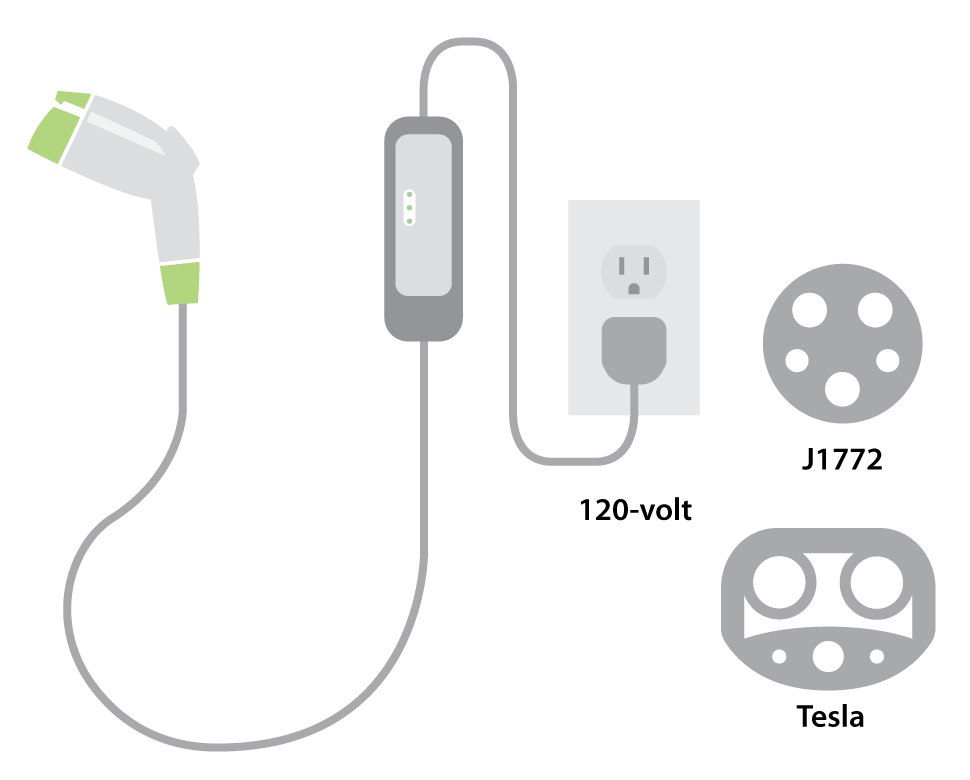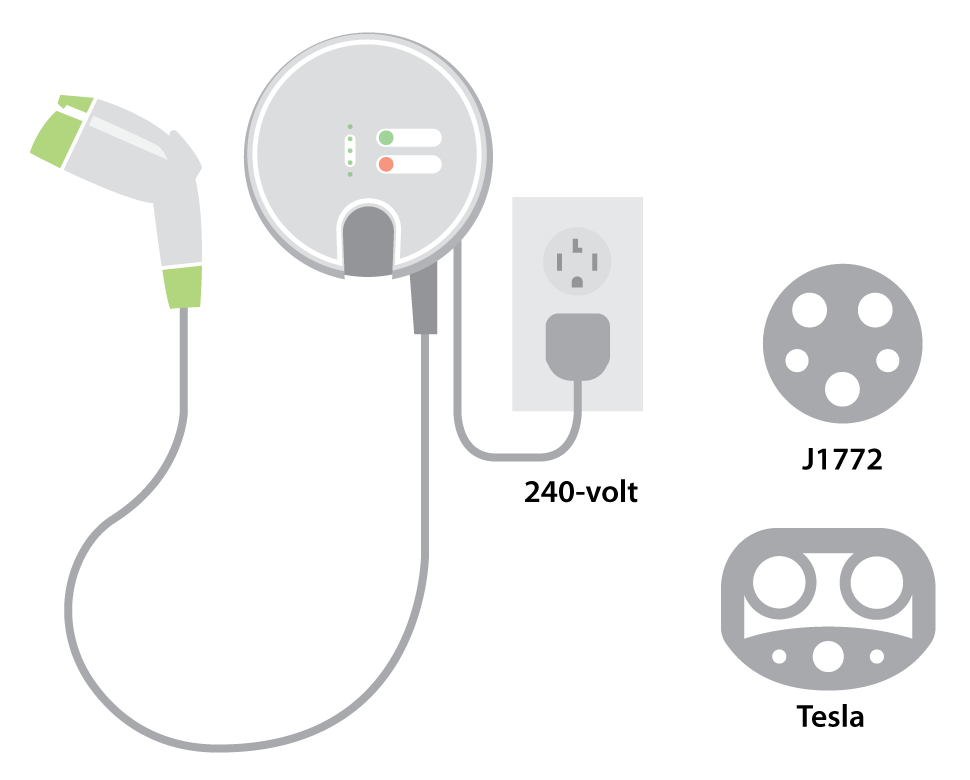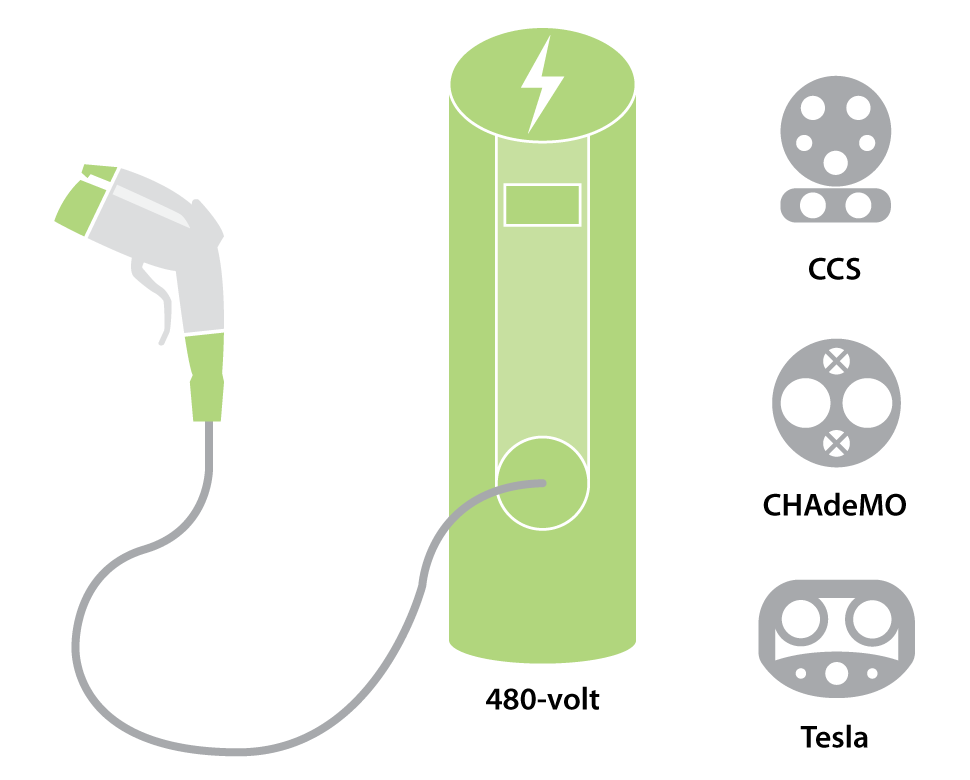Learn the differences between the three charging station options and find the average costs for charging at home and on the go
Electric Vehicle Charging Basics
Imagine never having to stop at a gas station again – and instead, having an unlimited supply of fuel available at home or wherever you normally park. For many electric vehicle (EV) drivers, this is a reality. Battery electric vehicles never need gas, and for short trips, plug–in hybrids might use no gas.
EV charging is simple, cost–effective, clean and convenient, particularly when you are plugged in at home – filling up your car, even while you’re asleep.
There are three categories of electric vehicle (EV) charging: Level 1, Level 2 and DC fast charging. Levels 1 and 2 charging use a universal connector that can be plugged into any EV. DC fast charging uses three different connector systems called CHAdeMO, CCS Combo and Tesla Supercharger.
Although EV drivers primarily charge at home, workplace and public chargers are increasingly available in communities nationwide. Use our EV Charging Station Map to find nearby charging stations.
Level 1 Charging

Level 1 is the slowest method of charging but is sufficient for drivers who charge overnight and travel 30–40 miles per day. Charging cables usually come with a vehicle and plug into a standard 120–volt AC outlet with no equipment installation required. Level 1 charging works well for charging at home, work or anywhere a standard outlet is available – and when you have sufficient time to charge.
Level 1 charging uses a standard J1772 or Tesla connector that can plug into any EV, either directly, or through an adapter.
Level 1 charging adds about 3.5 – 6.5 miles of driving range per hour of charging time.
Level 2 Charging

Level 2 charging is considerably faster, but requires installing a charging station, also known as electric vehicle supply equipment (EVSE). EVSE requires a dedicated 240–volt or 208–volt electrical circuit, similar to what is required for a clothes dryer or electric range. Level 2 is found at many public and workplace charging stations, but also in many homes. It uses the same standard connector as Level 1 charging, meaning any EV can plug in at any Level 2 charger.
Level 2 charging uses a standard J1772 or Tesla connector that can plug into any EV, either directly, or through an adapter.
Depending on battery type, charger configuration and circuit capacity, Level 2 charging adds about 14 – 35 miles of range per hour of charging time.
DC Fast Charging

DC fast charging, also called quick charging or supercharging, provides the fastest available fill–up. It requires a 480–volt connection, making DC fast charging unsuitable for home use, and not every EV model is equipped for it. Stations offering DC fast charging are found in shopping centers and often along major travel corridors, allowing EV drivers to charge up quickly and take longer trips.
DC fast charging uses CHAdeMO, CCS or Tesla connector systems. Check with your vehicle manufacturer to determine if your car has fast charging capability and what connector systems are compatible with your EV.
Depending on battery type, charger configuration and circuit capacity, DC fast charging can add up to 100 miles of range in about 30 minutes of charging time.
Electric Vehicle Charging Costs
Home Charging Costs
The cost to charge your electric vehicle depends on your vehicle’s battery size and the price of electricity where you live. Most utilities offer time–of–use (TOU) rates that greatly reduce costs associated with charging a vehicle at home by charging during off–peak hours. Contact your utility to find out more.1
While electricity costs vary greatly, the average cost of electricity in California is about 16.58¢ per kilowatt hour (kWh).2 At this price point, charging a 40–kWh battery with a 150–mile range would cost about 4.42¢ per mile (or about $6.63 to fully charge). Meanwhile, fueling a 25–mpg gas vehicle at California’s average gas price of $3.11 per gallon3 would cost about 12.44¢ per mile (or about $18.66 for enough gas to drive approximately 150 miles).
Home charging costs can be offset by hosting your charger on a home charging sharing network. EV drivers can earn money by sharing their home chargers or connect with other hosts to find convenient charging on the go. For more information about how you can earn money by sharing your home charger, please see these popular sharing networks:
Public Charging Costs
While charging at home is generally preferred, many people also charge their EV at public charging stations. These stations can be free, pay–as–you–go or subscription-based, and prices are set by networks or property owners. Some vehicle manufacturers, such as Hyundai, Nissan and Tesla also provide complimentary public charging.
One popular public charging network charges members $1.50 per hour to charge on Level 2, and 26¢ per minute for DC fast charging in California.4 At these rates, charging a 40–kWh battery with a 150–mile range would cost about 8¢ per mile on Level 2, and 9¢ per mile for DC fast charging.
For more information about public charging networks, here are some popular options available in California:
1 A list of utility providers is at https://www.energy.ca.gov/almanac/electricity_data/utilities.html
2 https://www.eia.gov/electricity/state
3 https://www.energy.gov/articles/egallon-how-much-cheaper-it-drive-electricity
4 https://www.evgo.com/charging-plans/
Charging Station Rebates
Rebates for Residential Level 2 Charging Stations
Many California utility providers and air districts offer rebates to make home Level 2 charging stations more affordable. Some of the rebates also help to offset the cost of installing the charging station at your home if additional electrical work is required. Find available rebates where you live.
Rebates for Commercial EV Charging Stations
Property owners can take advantage of rebates for installing commercial charging stations for public use. EV charging is a desired amenity for many California drivers and can attract more traffic to your business, improve tenant or employee satisfaction and generate a new revenue stream (fees for charging). Following are incentives that decrease the cost of charger purchases and installation. Visit the websites for more information on program eligibility requirements and funding availability.
Utility Incentives
Utility | Program Name | Maximum Rebate Amount |
|---|---|---|
| Anaheim Public Utilities | Plug‐In Electric Vehicle Charger Rebate | $10,000 per DC fast charger or $5,000 per Level 2 charger |
| Burbank Water and Power | EV Charger Rebate | $5,000 per Level 2 or DC fast charger |
| City of Palo Alto Utilities | EV Charger Rebate | $8,000 per Level 2 or DC fast charger |
| City of Ukiah Electric Utility Department | Level 2 EV Charger Rebate | $4,000 per dual hose Level 2 charger |
| Colton Public Utilities | EV Charger Rebate | $5,000 for L2 charger (limit 1 per business) |
| Glendale Water and Power | Charging Station Rebate | $4,000 per Level 2 or DC fast charger |
| Los Angeles Department of Water and Power | Charge Up LA! | $75,000 per DC fast charger |
| Lodi Electric Utility | Electric Vehicle Charger Rebates | $6,000 per Level 2 charger |
| Marin Clean Energy | EV Charging Program | $3,500 per port on Level 2 chargers |
| Modesto Irrigation District | Electric Vehicle Charger Rebate | $500 per Level 2 charger |
| Pacific Power | Charging Station Grant | Varies based on cost |
| Pasadena Water and Power | Commercial Charger Incentive Program | $6,000 per Level 2 or DC fast charger |
| Rancho Cucamonga Municipal Utility | EV Commercial Charger Rebate | $5,000 per Level 2 or DC fast charger |
| Redding Electric Utility | Commercial EV Rebate | $3,000 per Level 2 or DC fast charger |
| Roseville Electric | Commercial EV Rebate Program | $6,000 per Level 2 charger |
| Sacramento Municipal Utility District | Commercial Charging Pilot | $1,500 per Level 2 charger |
| Sillicon Valley Clean Energy and EV Match | Innovation OnRamp EVMatch Multi-Unit Dwelling Pilot | $8,000 per L2 charger |
| Silicon Valley Power | Electric Vehicle Charging Station Rebate | $5,000 per Level 2 charger |
| Turlock Irrigation District | Commercial EV Charger Rebate | $1,000 per Level 2 charger |
Air District Incentives
Air District | Program Name | Maximum Rebate Amount |
|---|---|---|
| Antelope Valley Air Quality Management District | Electric Vehicle Charging Stations Program | 80% of infrastructure and installation costs for Level 2 and DC fast chargers |
| Eastern Kern Air Pollution Control District | DMV Grant Program | Up to $50,000 |
| Feather River Air Quality Management District | Mini Grant Program | Up to $2,000 |
| Mojave Desert Air Quality Management District | EV Charging Incentives | 80% of infrastructure and installation costs for Level 2 and DC fast chargers |
| North Sonoma County Air Pollution Control District | Go Green! | $4,000 per Level 1 charger, $5,000 per Level 2 charger or $8,000 per DC fast charger |
| Sacramento Metro Air Quality Management District | Infrastructure Incentives | Up to 100% of project costs |
| San Joaquin Valley Air Pollution Control District | Charge Up! | $6,000 per Level 2 charger or $25,000 per DC fast charger |
| San Luis Obispo Air Pollution Control District | Electric Vehicle Infrastructure Program | 65% of infrastructure and installation costs for Level 2 and DC fast chargers |
| Santa Barbara Air Pollution Control District | Electric Vehicle Charging Station Infrastructure Program | $10,000 per Level 2 charger or $20,000 per DC fast charger |
| Yolo Solano Air Quality Management District | Clean Air Funds Grant | Varies based on project cost |
State Incentives
Project | Project Name | Maximum Rebate Amount |
|---|---|---|
| California Electric Vehicle Infrastructure Project (CALeVIP) | Central Coast Incentive Project | Up to $7,500 per Level 2 charger, up to $80,000 per DC fast charger |
| California Electric Vehicle Infrastructure Project (CALeVIP) | Northern California Incentive Project | Up to $7,500 per Level 2 charger, up to $80,000 per DC fast charger |
| California Electric Vehicle Infrastructure Project (CALeVIP) | Peninsula-Silicon Valley Incentive Project | Up to $6,000 per Level 2 charger, up to $80,000 per DC fast charger |
| California Electric Vehicle Infrastructure Project (CALeVIP) | Sacramento County Incentive Project | Up to $6,500 per Level 2 charger, up to $80,000 per DC fast charger |
| California Electric Vehicle Infrastructure Project (CALeVIP) | San Diego County Incentive Project | Up to $6,000 per Level 2 charger, up to $80,000 per DC fast charger |
| California Electric Vehicle Infrastructure Project (CALeVIP) | San Joaquin Valley Incentive Project | Up to $5,000 per Level 2 Charger, up to $80,000 per DC fast charger |
| California Electric Vehicle Infrastructure Project (CALeVIP) | Sonoma Coast Incentive Project | Up to $7,500 per Level 2 Charger, up to $80,000 per DC fast charger |
| California Electric Vehicle Infrastructure Project (CALeVIP) | Southern California Incentive Project (SCIP) | $80,000 per DC fast charger |
